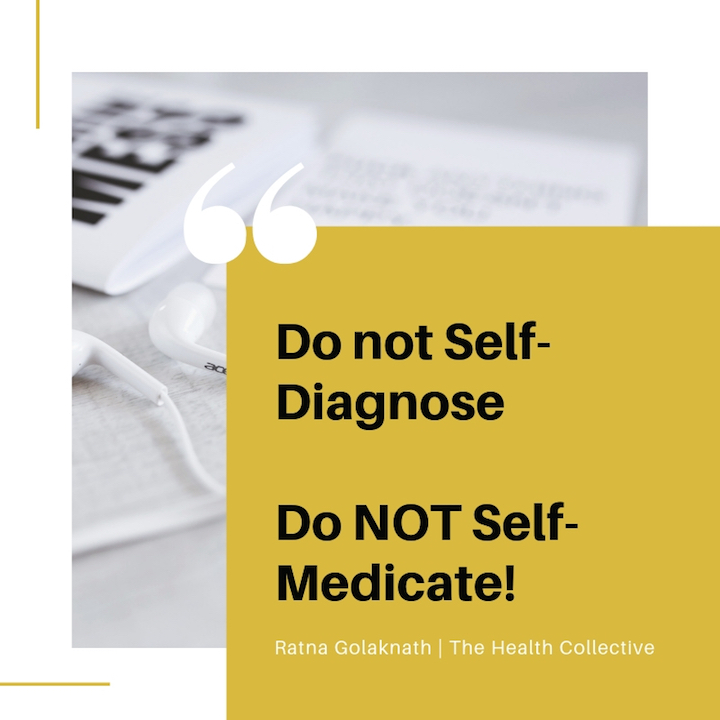Ask the Experts: Dr Google and the Problem with Self-Diagnosis
By Ratna Golaknath
Don’t we always know when something doesn’t feel quite right with us? Aren’t we the first to figure out when our mood is low, irritable or even exuberant or aggressive? Sometimes we pick up on the pattern in our moods- ‘I get really low around my period’, ‘ I find the holidays very depressing’. Sometimes we can predict our triggers- death anniversaries, anxiety over performance, lack of sleep.
Self-awareness helps us take care of ourselves but more often than not, it leads us towards self-diagnosis and much too often, we label ourselves depressed, OCD, bipolar or even as someone with personality disorders. Often times, these terms are used so frivolously that one may not take them seriously. But they can also lead us down the path of online searches, to do a truly frightening amount of reading on these disorders and consequently, further complicate a stressed state of mind.
If you have self-diagnosed a mental health condition or if it has been suggested that you might have a diagnosis, one of the most useful things to do is to take considerations for your mental health. The minute you google in a search on depression or mental health, you will be targeted by sponsored advertisements and questionnaires of all kinds. As tempting as it may be, it is strongly recommended that you avoid online mental health tests. These are the kind of tests that pop up all over your social media timelines and offer multiple choice questions and quick easy diagnosis. A test to assess mental health conditions is a serious test, it needs to be undertaken in consultation with a professional.
ALSO READ: MORE ON UNDERSTANDING THERAPY
While gathering more information can be an empowering process, the downside is that it can create panic. It is a common experience that most people will identify with a number of symptoms when they start researching. The academic term for this is getting a “false positive result rate”. This phenomenon can leave you overwhelmed and frightened by possibilities. Therefore do not jump into googling the disorder and drowning yourself in a minefield of clinical terms and jargon. Information may be a starting point, but it is more helpful to continue the conversation with a professional who is trained to assess and treat mental health problems.
ALSO SEE: CONTACTS AND HELPLINES IN INDIA
It is important to remember that mental health is a subjective experience and therefore requires an in depth assessment. It is in collaboration with a professional that you will best be able to make sense of your mental health and draw out the patterns that might have sustained over a period of time. The intensity of the moods and the impact on your day to day to living are other factors that will inform your diagnosis based on universally accepted diagnostic criterion.

Though research and a gut feeling and self-assessment are important in leading you towards seeking an intervention with a specialist please do not jump to diagnosing yourself or certainly do not self-medicate. Medication must be taken under supervision of a psychiatrist and symptoms must be closely monitored especially in the first 3 months. Your doctor will need information from you about your other health issues or medication and you may be asked to undertake certain blood tests. You may be called for frequent reviews till the medicine stabilises for you. You must sit with the doctor and understand the side effects and the manner in which the medicines will affect your treatment. In many ways your observations of your mood and your self-assessment will be one of the most important parts of the treatment plan. However, this insight will be best aided by a professionals medical training and clinical skills of interpretation.
It is also useful to keep in mind that sometimes our mental health is affected by very understandable and stressful life circumstances. At other times mood can also be linked to allied health problems such as thyroid or a deficiency in certain vitamins or hormonal imbalances as well. A professional mental health expert is trained to ask questions and rule out other conditions.
MENTAL HEALTH AS A SPECTRUM
Remember, you are at the centre of the relationship with your doctor and while the information and observations you bring to the professional will be key to the assessment yet, if you are already convinced of a diagnosis it might lead you to undermine the neutrality of the clinical assessment. It is also imperative to understand that mental health has a huge spectrum. For example, at one end you could range from mild anxiety, that could be treated without medication and with cognitive behaviour therapy, while at the other end you could have obsessive compulsive disorder which may require medication and might be hampering your day to day living to the extent that you are house bound and isolated.
You need a professional to assess where you are on that spectrum. Though by all means, stay well-informed!
ALSO READ: HOW DOES THERAPY WORK
From the perspective of the therapist, it is always encouraging to work with clients who are self-aware and who might bring their own curiosity and information to the therapeutic practice but sometimes this could lead to an urgency to diagnose and treat. This urgency is likely to influence the way the therapeutic relationship develops. Therefore, it is useful to find the balance between being informed and staying neutral to the process of developing a hypothesis.
While it can be debated that the idea of self-diagnosis can be risky, especially with mental health issues, yet most professionals agree that when someone thinks they may be depressed, more often than not they are. Moreover, if you or a loved one is feeling at risk of harming themselves or having thought of harming another please immediately talk to someone.
(You’ll find suicide prevention and other helplines listed here)
It is helpful to reach out to the people around you, a caring family member, your local GP, a teacher at school or even a friend or helpful colleague. Having someone looking out for you and accompanying you to seek support can help through this period.
Self-awareness becomes one of the most important steps towards taking care of your mental well being and in many cases it is a step towards early intervention and diagnosis. So do stop and check in on your mental well being from time to time.
**If reading this article has made you feel you would like to speak to a professional please do not delay reaching out. In most larger cities you will find larger government hospitals have a department of psychiatry. In addition, private hospitals like Apollo, Max and Fortis. NIMHANS (Bangalore), PGIMER(Chandigarh), RIMS (Ranchi), IHBHAAS (Delhi), AIIMS (Delhi), VIMHANS (Delhi) TISS (Bombay), provide services for people with mental illness. There are also a number of NGOs that work in the area of mental health. If you are unable to find a service in your city please let us know where you are based and we will try and recommend a service close to you. We do not provide therapeutic or medical services through our portal but we are committed to link you to information that will improve access to mental health services.**
You can also check out a crowd-sourced list here and the TISS iCall list here.
Disclaimer: Material on The Health Collective cannot substitute for expert advice from a trained professional
Feature Image: Photo by Randy Jacob on Unsplash



Pingback: Five Years in, Sheroes Helpline Aims for High Empathy, Deep Impact
Pingback: Helpline insight: What Sheroes has Learned from Sixty Thousand Callers